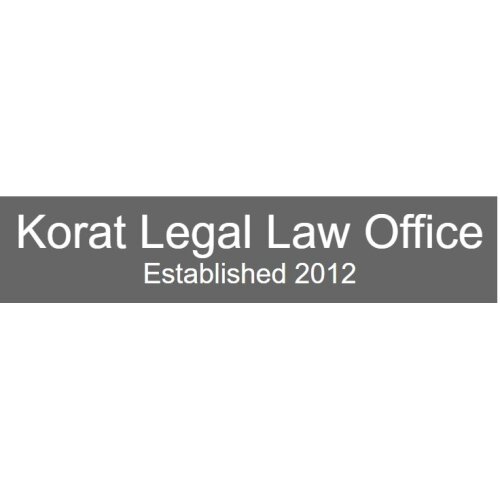Best Land Use & Zoning Lawyers in Nakhon Ratchasima
Share your needs with us, get contacted by law firms.
Free. Takes 2 min.
Free Guide to Hiring a Real Estate Lawyer
List of the best lawyers in Nakhon Ratchasima, Thailand
Thailand Land Use & Zoning Legal Articles
Browse our 2 legal articles about Land Use & Zoning in Thailand written by expert lawyers.
- Building Regulations in Thailand: Tips for Property Development
- In the world of property development in Thailand, understanding the local building regulations is absolutely crucial. It can save you from potential legal issues and help ensure a smooth property development process. In this guide, we will walk you through the key aspects of building regulations in Thailand and offer... Read more →
- Land Ownership in Thailand: Title Deeds
- Land ownership in Thailand is not a readily available option for foreign individuals. Foreign companies may have opportunities to own land, particularly through BOI certifications, subject to qualifying business activities and a rigorous application process. Nevertheless, it is still relevant to understand the various title deeds in use in Thailand,... Read more →
About Land Use & Zoning Law in Nakhon Ratchasima, Thailand
Land use and zoning laws in Nakhon Ratchasima, Thailand, are designed to manage the way land is developed and used to ensure sustainable development, protect natural resources, and promote economic growth. These laws regulate various aspects of property such as land development, building dimensions, permissible land use, spatial development planning, and conservation of environmentally sensitive areas. Zoning regulations divide land into residential, commercial, industrial, and agricultural zones, each with specific rules and requirements. Understanding these laws is crucial for landowners, developers, and investors to ensure compliance and avoid legal conflicts.
Why You May Need a Lawyer
Engaging a lawyer specializing in land use and zoning can be beneficial for various reasons. If you're planning a construction project, re-zoning a property, engaging in land development, or facing legal challenges related to land disputes, a lawyer can provide necessary legal guidance. Lawyers can also assist in navigating government bureaucracy, preparing and submitting applications for permits and zoning changes, and representing clients in disputes over zoning violations or compensation claims due to governmental land-use decisions. To avoid costly mistakes and ensure that your interests are adequately protected, professional legal assistance is often recommended.
Local Laws Overview
Key aspects of land use and zoning laws in Nakhon Ratchasima involve regulations set forth by the Thai government and local municipalities. This includes town planning regulations, environmental protection laws, building codes, and rules regarding agricultural and industrial land. Permits must often be obtained from local administrative authorities to make changes to land use or to construct buildings. Public participation is an essential part of the zoning process, and stakeholders often have the opportunity to voice concerns or support during public hearings. Being aware of these local laws and procedures is crucial for anyone interested in real estate or long-term investments in the region.
Frequently Asked Questions
What is zoning, and why is it important in Nakhon Ratchasima?
Zoning is the process of dividing land into distinct areas with specific development criteria. In Nakhon Ratchasima, zoning ensures that land is developed in an organized manner, balancing urban growth with environmental sustainability.
How can I find out the zoning classification of a particular property?
You can obtain zoning information by contacting the local municipality's planning department or consulting with a legal expert for precise zoning details.
Can I change the zoning classification of my property?
Yes, but changing a property's zoning classification requires an application process, public hearings, and approval from the local authority. Legal guidance can be beneficial in this process.
What permits do I need for construction in Nakhon Ratchasima?
Construction typically requires a building permit, and possibly other environmental and safety assessments, all of which can be guided by consulting experts or legal counsel familiar with local regulations.
Are there restrictions on land use based on environmental concerns?
Yes, certain areas are protected due to environmental factors, and there are regulations to prevent activities that would harm these sensitive zones.
What can I do if I disagree with a zoning decision?
Disputes over zoning decisions can often be contested through administrative processes or legal action, with the aid of a lawyer experienced in land use law.
How is agricultural land regulated in Nakhon Ratchasima?
Agricultural land is subject to specific zoning laws to maintain agricultural productivity and protect natural resources, and conversion for other uses may have restrictions.
What impact does urban planning have on zoning laws?
Urban planning shapes zoning laws by defining a framework for development that balances infrastructure needs with community welfare and environmental protection.
Can zoning laws impact real estate prices?
Yes, zoning laws can significantly influence property values, affecting what can be developed on the land, which in turn impacts demand and market value.
Who enforces zoning laws in Nakhon Ratchasima?
Zoning laws are primarily enforced by local government offices, such as municipal planning departments, which ensure compliance through inspections and regulatory oversight.
Additional Resources
For further assistance in land use and zoning matters, individuals can consult the following resources: - Local government or municipal offices in Nakhon Ratchasima for official information and permit processes. - The Thai Department of Land for general property records and land administration policies. - Legal firms specializing in property and environmental law that provide expertise on compliance and litigation. - Non-governmental organizations and community groups that offer guidance and advocacy in zoning-related issues.
Next Steps
If you need legal assistance regarding land use and zoning in Nakhon Ratchasima, consider these steps: - Research and reach out to local legal professionals with expertise in land use and zoning laws. - Gather all relevant documents related to your property and proposed development plans. - Schedule a consultation to discuss your specific situation and options available. - Stay informed about local regulations and participate in public hearings if applicable. Taking these steps can ensure that you are well-prepared and supported in navigating the complexities of land use and zoning law in Nakhon Ratchasima, Thailand.
Lawzana helps you find the best lawyers and law firms in Nakhon Ratchasima through a curated and pre-screened list of qualified legal professionals. Our platform offers rankings and detailed profiles of attorneys and law firms, allowing you to compare based on practice areas, including Land Use & Zoning, experience, and client feedback.
Each profile includes a description of the firm's areas of practice, client reviews, team members and partners, year of establishment, spoken languages, office locations, contact information, social media presence, and any published articles or resources. Most firms on our platform speak English and are experienced in both local and international legal matters.
Get a quote from top-rated law firms in Nakhon Ratchasima, Thailand — quickly, securely, and without unnecessary hassle.
Disclaimer:
The information provided on this page is for general informational purposes only and does not constitute legal advice. While we strive to ensure the accuracy and relevance of the content, legal information may change over time, and interpretations of the law can vary. You should always consult with a qualified legal professional for advice specific to your situation.
We disclaim all liability for actions taken or not taken based on the content of this page. If you believe any information is incorrect or outdated, please contact us, and we will review and update it where appropriate.









